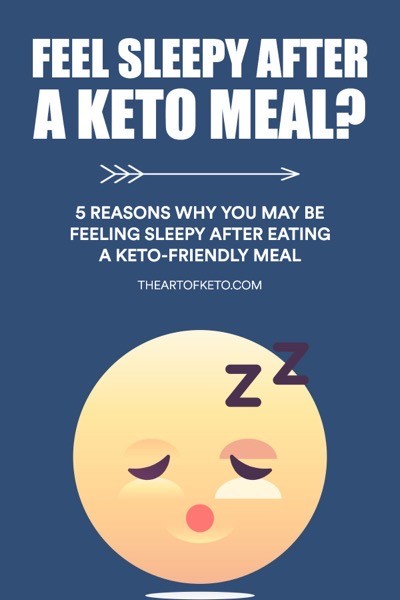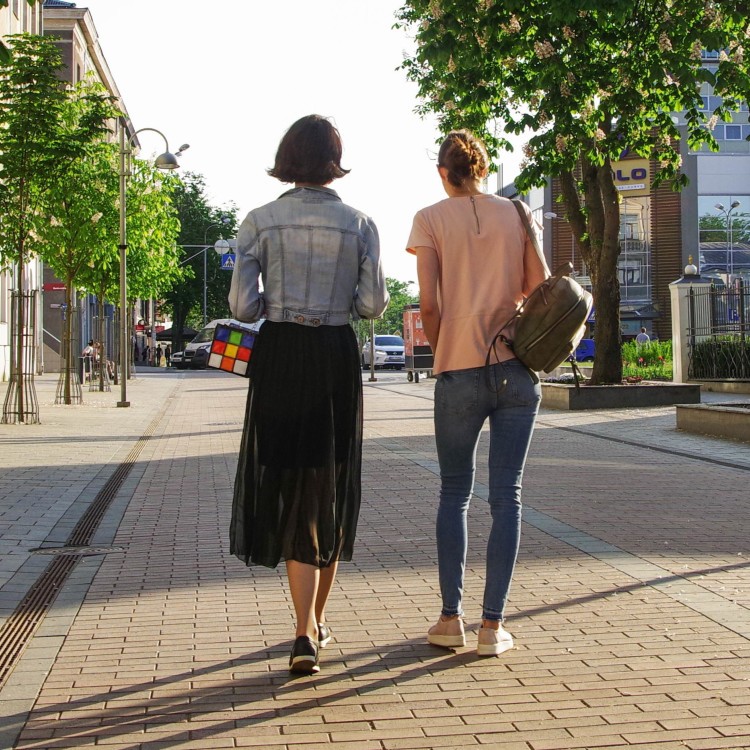On a ketogenic diet, you’re told you’ll have endless amounts of energy, no insulin spikes, and, therefore, shouldn’t be feeling sleepy after meals on keto…
So what gives?
Why you’re sleepy after meals on keto? There are various reasons you could be feeling sleepy after your meals on keto; some of those reasons include:
- Serotonin production
- Food sitting in your gut
- Eating foods high in tryptophan
- Inflammation or a food sensitivity
- Cholecystokinin (CCK) release
In this article, I’ll go over the different reasons you may be feeling tired or sleepy after eating a keto meal, what to do about it, and dispelling reasons you may THINK is causing you to feel sluggish but not likely.

Table of Contents
Why You Get Sleepy After Eating Your Keto Meal
You were told when you started a ketogenic diet that you’d have more energy; I get it. You were also told you wouldn’t experience the highs and lows anymore that are typically associated with a diet full of carbohydrates.
After all, you’re not eating very many carbs, if any at all.
There’s no one exact cause as to why you may want to snooze after your keto meal, but the chances are it may be one or a couple of the following reasons.
Just know that a little bit of sleepiness after a meal, keto or not, is entirely normal and nothing to worry about.
Reason #1 Inflammation or a food sensitivity
Chronic disease is driven by inflammation, but so can sleepiness. Inflammatory cytokines may suppress orexin; hypothalamic neuropeptides thought to play a key role in sleep and wakefulness. 1
There is strong evidence that narcolepsy is associated with a disruption in these same hypothalamic neuropeptides. 2 Narcolepsy is a chronic sleep disorder that results in overwhelming daytime drowsiness or sudden onset of sleep.
Fix: Try an elimination type diet by eliminating foods you may believe are causing problems and/or foods notorious for causing issues for others. An extreme version of an elimination type diet would be trying a carnivore-type diet (eating only meat) and slowly adding in different foods to test your tolerability.Reason #2 Tryptophan containing foods
You’ve heard of the post-Thanksgiving meal sleepiness, that’s because many people believe turkey is to blame as it’s high in an amino acid called tryptophan.
Tryptophan is essential in creating the neurotransmitter serotonin, which is involved in sleep and relaxation.
One study suggests this may be a primary cause in people who have chronic fatigue syndrome and fibromyalgia, which affects women more so than men. 3
You may be thinking, but I didn’t eat turkey… It turns out turkey doesn’t contain as high a level of tryptophan when you compare it to other common keto-friendly foods.
Tryptophan is generally found in high-protein foods such as:
- Cheddar cheese
- Parmesan cheese
- Paneer cheese
- Spinach
- Pork
- Hard-boiled eggs
- Fish
- Chocolate
- Chicken
Reason #3 Cholecystokinin (CCK)
CCK is a gut hormone that is primarily released in response to a fat-rich meal, especially long-chain fats (PUFAs, MUFAs, and saturated). 4
In animal studies, olive oil is often used to induce CCK release. 5
What’s this have to do with feeling sleepy after meals on keto? Scientists suspect that CCK may cause sleepiness or fatigue as it directly interacts with the hypothalamus. 6
Additionally, rats given a CCK blocker helped to prevent post-meal fatigue; however, it exhibited opposite an opposite effect in humans. 7
Reason #4 Larger meals require more energy
Many people following a ketogenic diet may also begin to practice different forms of eating patterns, like intermittent fasting (IF). This generally means that people following an IF style of eating will eat fewer but more substantial meals.
Larger meals require more energy to digest.
If you follow an intermittent fasting style of eating, this may be why you feel tired after breaking your fast.
The parasympathetic nervous system (PNS), also known as the “rest and digest portion,” is activated when you eat. The PNS helps to conserve energy by slowing your heart rate and potentially making you “sleepy.”
During this period, blood flood is diverted to your gut to help digest food. In addition, there is increased stimulation of digestive enzymes and liver activity that occurs. 8 9
It’s completely normal to feel tired after a meal; it’s your body’s hormonal response to help you digest.
However, eating more massive and less frequent meals may exacerbate this feeling after each meal due to the quantity.
Fix: Try eating smaller but more frequent meals throughout the day to see if that helps you with your tiredness after your keto meals.Reason #5 Low stomach acid
There may be a chance you’re not digesting your food.
If you feel as if food sits in your stomach after a meal, giving you that bloated and distended stomach feeling, this may apply to you.
Many of the same individuals who suffer from heartburn or acid reflux on keto may also find that they feel sleepy after meals on keto.
Without sufficient stomach acid, food cannot be effectively broken down and digested.
Fix: To help with stomach acid, there are a few simple but useful tips you can use.- Make sure to chew your food thoroughly; digestion begins in your mouth.
- Eat fermented vegetables like kimchi, sauerkraut, and even kefir.
- Drink apple cider vinegar before a meal diluted with some water
- Add fresh ginger to your keto diet
Keto Crash After Lunch
There may be a good reason why you feel more tired after lunch than any other meal, and you’re not alone. The afternoon or post-lunch dip (more like a crash) is a real phenomenon. 10
And guess what? This may occur even if you skipped lunch, but also seems to affect the more extreme morning-type of people.
After 10 AM, the urge to sleep starts to rise and peaks around 2 pm. 11 This is all part of the natural rhythm to wakefulness, referred to as our circadian clock.
Ways To Combat Feeling Sleepy After Your Keto Meals
There are some simple steps you can take to prevent feeling sleepy after meals. Certain dietary and lifestyle habits can help you maintain optimal energy levels and counteract the sleepiness you usually experience.
Short 10-minute walks

Go for a short walk after your meal; this will help you better absorb and digest your food. Exercise can also help keep you more alert during the day, minimizing the chance you’ll experience that “post-lunch dip.”
A brisk 10-minute walk after meals also helps improve insulin sensitivity, decrease gas, and improves digestion.
Also, three 10-minute walks may be superior to one 30-minute walk according to some researchers. 12 13 14
Smaller meals
If you practice intermittent fasting, chances are you’re eating more substantial meals than you usually would.
First, let me put your mind at ease and let you know that intermittent fasting ISN’T superior for fat loss as most people have been led to believe. 15
Large meals require more energy to digest, thus diverting your body's resources (including your energy) to help with digestion.
Try splitting your meals up.
Drink water and add electrolytes
Many folks following a ketogenic diet find themselves suffering from a variety of adverse side effects, such as the keto flu.
A lot of these unwanted side-effects are a result of both dehydration and an electrolyte imbalance.
Ensuring you’re drinking enough water, but also taking in an adequate amount of electrolytes may help boost and sustain energy levels. 16
I recommend individuals take an electrolyte supplement, preferably with ample amounts of potassium.
Electrolyte supplements I recommend:
The Takeaway
Sometimes feeling tired or sleepy after a meal on keto is entirely reasonable. However, there are specific dietary changes or lifestyle habits we can implement to maintain optimal energy levels.
If some of the tips above don’t seem to help, and the problem is disrupting your quality of life, it wouldn’t hurt to talk to your doctor as there may be an underlying problem.
Frequently Asked Questions
Is it normal to feel sleepy during keto?
When people start going on the keto diet, they initially feel very tired. That's because fatigue occurs because the body switches from burning carbs to burning fat for energy.
How long can keto fatigue last?
Keto fatigue is a fairly common occurrence in those that start the diet. Typically, the fatigue will last around 10 days. If symptoms continue to persist after that it's a good idea to visit a doctor.
How do I regain energy on keto?
The keto diet isn't one that causes you to feel less energetic. However, if you don't eat the right food you'll start to feel depleted. It's better to include healthy fats in the meals as they will serve as a good source of energy.